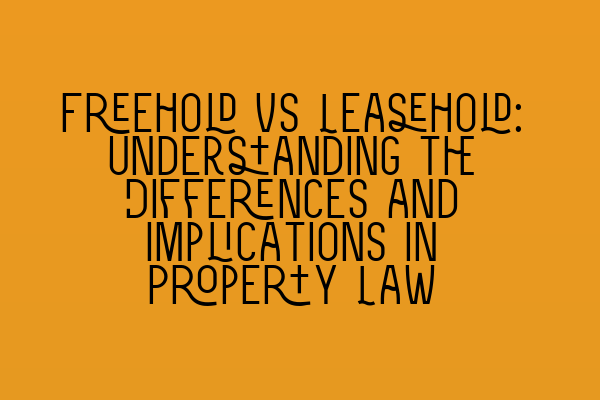Freehold vs Leasehold: Understanding the Differences and Implications in Property Law
When it comes to buying property, particularly in the UK, you may come across the terms “freehold” and “leasehold”. These terms define the type of ownership you have over a property and can have significant implications for your rights and responsibilities as a homeowner. In this article, we will explore the differences between freehold and leasehold, and shed light on the key considerations to keep in mind when making a property purchase.
Freehold Ownership:
Let’s begin with freehold ownership. In simple terms, when you own a property on a freehold basis, you have outright ownership of both the land and the buildings on it. This means that you have complete control over the property and can make changes to it as you see fit, subject to planning and building regulations.
One of the key advantages of freehold ownership is the absence of any time restrictions. You own the property indefinitely, and it can be passed on to future generations. This type of ownership is often associated with houses, and most people prefer to own their own homes on a freehold basis. It gives a sense of permanence and allows for greater flexibility in using and modifying the property.
Leasehold Ownership:
On the other hand, leasehold ownership involves owning a property for a fixed period of time, typically long-term leases lasting 99 to 999 years. With leasehold ownership, you buy the right to occupy the property for the duration of the lease, but you do not own the land it stands on. The land is typically owned by a landlord or a freeholder.
Leasehold ownership is more commonly associated with flats and apartments, where multiple units are housed within a single building or development. In these cases, the leasehold structure ensures that the communal parts of the building, such as the roof, hallways, and gardens, can be properly managed and maintained by the landlord or a management company.
Rights and Responsibilities:
Understanding the rights and responsibilities associated with freehold and leasehold ownership is essential before making a property purchase. As a freeholder, you are responsible for the maintenance and repair of the entire property, including both the land and buildings. This gives you the freedom to make changes and improvements to the property without seeking permission from anyone else.
On the other hand, as a leaseholder, your responsibilities are typically limited to maintaining the interior of your property, as the landlord or freeholder is responsible for the upkeep of the communal areas. Additionally, leaseholders may be required to pay ground rent, service charges, and other fees to the freeholder or management company for the maintenance and management of the building.
Implications for Financing and Resale:
Another crucial consideration when deciding between freehold and leasehold ownership is the impact on financing and potential resale value. Generally, freehold properties are more attractive to lenders, as they provide greater security and control for the homeowner. This can make it easier to secure a mortgage and potentially access better interest rates.
In contrast, leasehold properties may have certain restrictions when it comes to obtaining mortgage financing. Lenders will typically consider factors such as the remaining term of lease, ground rent, and service charges before approving a mortgage. It is important to carefully review the terms of the lease and seek professional advice to ensure that the property meets the requirements of mortgage lenders.
Furthermore, the resale value of leasehold properties may be influenced by the length of the lease. As the lease term decreases, the value of the property may decrease as well. It is important to be aware of the remaining term on the lease when buying a leasehold property, especially if you have plans to sell it in the future.
Seek Professional Advice:
As property law can be complex and varies depending on the jurisdiction, it is always recommended to seek professional advice from an experienced property solicitor when considering a property purchase. They can guide you through the nuances of freehold and leasehold ownership, explain the implications in your specific situation, and ensure that you make an informed decision.
At SQE Property Law & Land Law, we provide expert legal services in all aspects of property law. Our team of solicitors has extensive experience in helping clients navigate the intricacies of freehold and leasehold ownership. Contact us today for a consultation and let us assist you with your property purchase or any other property-related matter.
In Conclusion:
Understanding the differences between freehold and leasehold ownership is crucial when purchasing property. While freehold offers complete ownership and control, leasehold provides a longer-term right to occupy a property on land owned by someone else. Considerations such as rights and responsibilities, financing, and potential resale value must be carefully evaluated before making a decision.
If you are considering a property purchase, seek professional advice from a reputable property solicitor to ensure that you fully understand the implications and make an informed choice. SQE Property Law & Land Law is here to assist you every step of the way, providing expert guidance and support for all your property law needs.
Related Articles:
– SQE 1 Practice Exam Questions
– SQE 1 Practice Mocks FLK1 FLK2
– SQE 2 Preparation Courses
– SQE 1 Preparation Courses
– SRA SQE Exam Dates
